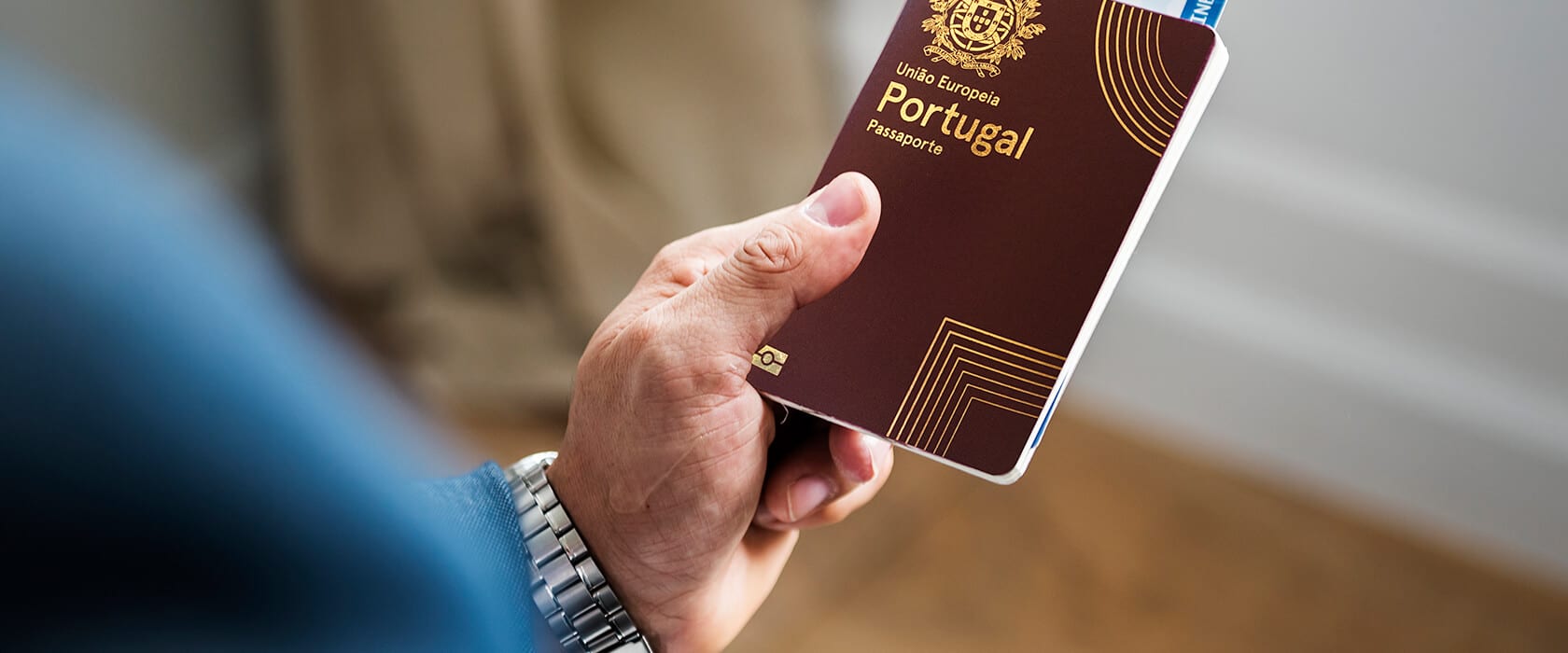Portugal’s Student Visa is a type of residence visa designed for non-EU/EEA citizens who wish to further their education in Portugal and possibly get Portuguese residency.
It allows international students to stay in the country for an extended period to pursue various educational programs, such as university degrees, exchange programs, or training courses.
In this article, we’ll take a look at:
- The types of Portuguese student visas
- Eligibility requirements
- Application process
- The costs and processing times
Can I study in Portugal?
Yes, both EU/EEA citizens and non-EU/EEA citizens can further their studies in Portugal. While both the secondary education and higher education applications fall under the same Student Visa category, the details are slightly different.
Types of Portuguese student visas

National Visa Temporary Category E: This visa is specifically for secondary education that follows primary/elementary school and typically serves students in their teenage years, usually from ages 12 to 18. It often includes middle school or junior high (lower secondary) and high school (upper secondary).
Temporary stay visas are valid during the entire stay (typically less than one year) and allow for multiple entries into Portugal.
National Visa Residency Type D: This visa category is for higher education that follows the completion of secondary education and includes undergraduate (bachelor’s), postgraduate (master’s and doctoral) degrees, and vocational training at colleges, universities, or specialized institutions.
Residency visas allow two entries into the country and are valid for four months. During that time, the holder of a residency visa must request a residency permit through Portugal’s Agency for Immigration, Migration, and Asylum (AIMA).
What are the eligibility requirements?
The Student Visa Portugal is available to non-EU/EEA citizens who plan on studying in the country. Whether it’s for a temporary visa or a residency permit, the most crucial requirement is that the applicant fulfills the admission criteria of their chosen study program.
Secondary education
To successfully apply for the Student Visa through secondary education, you must present evidence of being admitted or attending a recognized education program equivalent to levels 2 and 3 of the international standard education classification. This also includes student exchange programs.
In addition, you must also:
- Be between 14 and 21 years of age
- Proof of accommodation in suitable facilities within the educational establishment or elsewhere
- Proof of having been admitted to a course of qualification levels 4 or 5 of the National Qualifications Framework (QNQ) or training courses given by educational or vocational training establishments
- Proof of travel insurance and health insurance
- Proof of funds for the duration of the course or present a statement of responsibility
Students awarded a scholarship by the Instituto da Cooperação e da Língua (Institute for Cooperation and Language) are not required to present either the admission document or proof of sufficient means of subsistence.
Higher education
To study in Portugal as a higher education student, you must fulfill the admission criteria or show proof that you have been accepted to a university’s study program.

However, unlike the secondary education requirements, higher education students don’t need to show proof of health insurance, proof of admission conditions, or proof of acceptance into a higher education institution or means of subsistence.
But while that’s true for the Study Visa, applicants might need to show the evidence when applying for the residency visa once they are in Portugal.
There is an added benefit if you apply as a third-country national with Portuguese as the official language. During the application for the residency visa (after getting the Student Visa), you don’t need to show your admission documents or proof of sufficient means of subsistence.
Required Documents
In addition to the qualifying criteria for the Portugal Student Visa requirements, you must also submit the following documents:
- Letter of acceptance from the university/polytechnic applied to
- A valid passport (or travel document) that expires at least three months after you exit Portugal, with at least one blank visa page
- Two recent passport-size pictures. They must follow Schengen picture guidelines
- A completed application form specific to your visa type
- Proof of financial resources to cover your living expenses during your stay in Portugal
- One recent color passport photograph
- Proof of payment for the application fee may be up to €170.
- Schengen travel insurance that includes health coverage.
- A valid travel ticket or confirmed reservation to Portugal.
- Proof of accommodation arrangements, such as a rental contract, university housing confirmation, or a letter of invitation from a family member or friend in Portugal.
- A criminal record certificate.
Health insurance for international students
You must provide proof of health insurance coverage as part of your Portugal study visa application. The requirements vary depending on your country of origin:
- Non-EU/EEA Students: To qualify for a student visa, purchase private health insurance before arriving in Portugal.
- Brazilian Students: While Brazilian students have basic coverage under the Portuguese national health system, obtaining additional private health insurance for comprehensive emergency coverage is advisable.
- EU/EEA Students: You can use your European Health Insurance Card (EHIC) for medical coverage, but travel insurance is still required.
Language Requirements for Studying in Portugal
International students do not need to meet specific language requirements to acquire their visas. However, universities in Portugal will require proof of language proficiency for enrollment in courses or research programs.
For English-taught programs, you must demonstrate language proficiency through one of the following tests:
- TOEFL
- IELTS
- C1 Advanced
While not mandatory, having conversational Portuguese skills can be a valuable asset and enhance your experience living and interacting in Portugal. Fortunately, many Portuguese locals, especially younger people, are fluent in English, so navigating the country without Portuguese is generally manageable.
What is the application process for the Student Visa to Portugal?
The application process is similar to any other visa process for Portugal, and in most countries, this process is done through VFS Global. While it might vary depending on where you are applying from, generally, the application process is:

Step 1: In addition to gathering the required documents, download the Student Visa application form and fill it out.
Step 2: Book an appointment at the nearest Visa Application Center to have your fingerprints and photo taken.
Step 3: Once you have made your application, you will need to pay your visa application fee. The VFS service fee is €40, and the application is €90.
Step 4: Attend your Visa Application Center appointment and bring your documents and completed visa application form.
Step 5: Wait for an outcome and travel to Portugal when approved.
What are the costs and processing times?
The application fee for a student visa varies: €75 for the short-stay student visa and €90 for the long-stay student visa. This fee is non-refundable, even if your student visa application is denied.
Applications for D-type visas for Portugal are currently in high demand, which means processing times may be lengthy. Typically, the minimum processing time for these visas is three weeks. However, with the current AIMA backlog, applications can take two to three months.
Can I work with a Student Visa Portugal?
As an EU/EEA/Swiss student, you can work while studying in Portugal without any restrictions on working hours. Non-EU/EEA students, however, are subject to different rules.
They can work part-time (up to 20 hours per week) during the academic term and full-time during semester breaks and holidays, but only if they have a residency permit and their stay extends beyond 90 days.
International students enrolled in short courses (up to three months) with only a Schengen visa are prohibited from working.
Can I bring my family to Portugal on a Student Visa?
Yes, you can bring your family members to Portugal while you are on a student visa through the Family Reunification process.
You must have a valid student visa and residence permit in Portugal, and you need to show that you have sufficient funds to support your family members without needing public assistance.
The residence permit for family members can be renewed in line with the student’s permit. If you extend your stay for further studies or transition to a work permit, your family members’ permits can also be renewed accordingly.
Can I stay in Portugal after my studies?
Yes, you can stay in Portugal after completing your studies, but specific conditions and steps apply.

After finishing your studies, you may apply for a Portugal Job Seeker Visa that allows you to stay in Portugal to search for employment. This permit is valid for up to 12 months and enables you to legally remain in Portugal on the condition that you find employment within the first 120 days of the visa being issued.
If you secure a job after your studies, you can apply for a work visa or a residence permit for work purposes. This type of permit allows you to live and work in Portugal as long as you maintain employment and meet the permit requirements.
After living in Portugal for five consecutive years on temporary residence permits (which can include time spent as a student and on a job search or work visa), you may be eligible to apply for permanent residency.
Permanent residency grants you the right to live and work indefinitely in Portugal without needing to renew your visa every few years. If you meet certain criteria, it is also possible to apply for Portuguese citizenship.
Frequently Asked Questions About Portugal’s Study Visa
What is Portugal’s Study Visa?
Portugal’s Study Visa allows non-EU citizens to reside in Portugal for educational purposes. It is generally required for students enrolled in academic programs longer than 90 days, such as university degrees, courses, or internships.
Who needs a Study Visa to study in Portugal?
Non-EU citizens planning to study in Portugal for more than three months need to apply for a Study Visa. EU, EEA, and Swiss citizens do not need a visa to study in Portugal.
How long is the Portugal Study Visa valid for?
The duration typically aligns with the length of the academic program, up to one year. It can be renewed annually until the end of the educational course.
Can a Portugal Study Visa be extended?
Yes, extensions can be requested if the study program extends beyond the initial duration of the visa, provided the student continues to meet the visa conditions.
Can students work while studying in Portugal on this visa?
Yes, students are allowed to work part-time up to 20 hours per week during term time and full-time during holidays.







